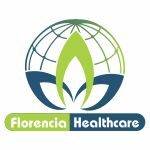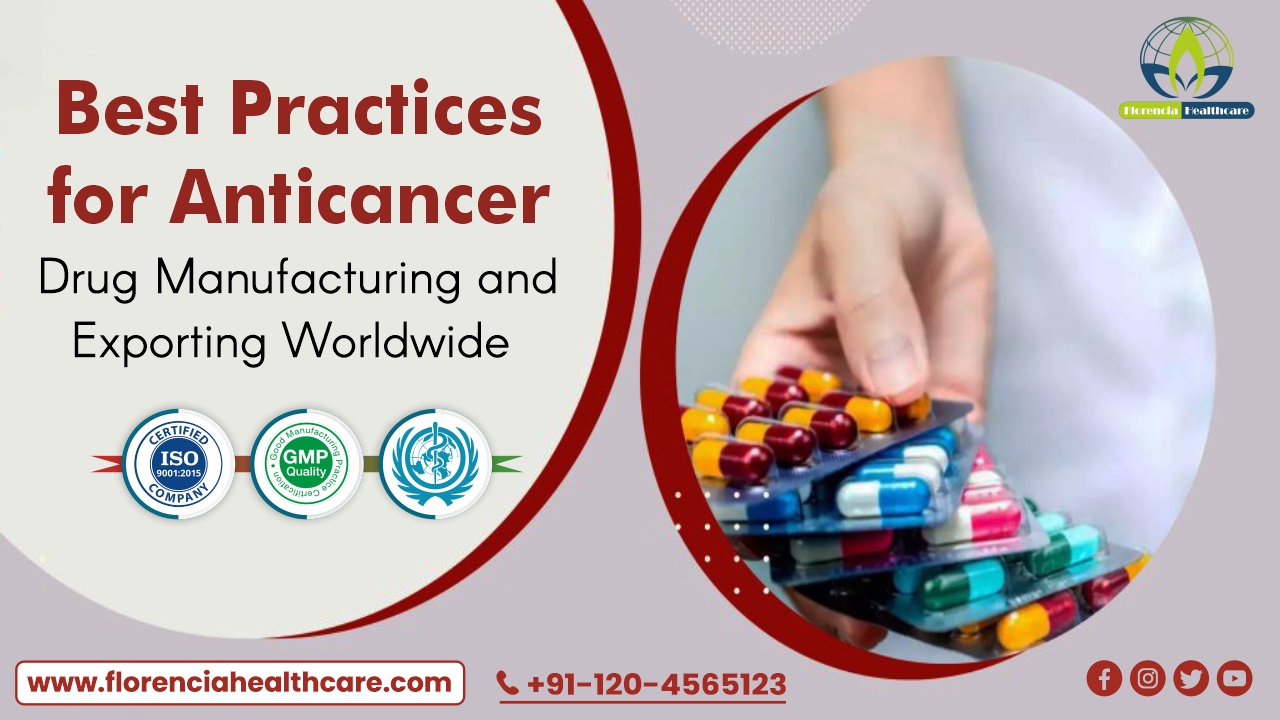The global demand for anticancer drugs has surged significantly over the past decade due to the rising incidence of various cancers and the growing awareness of effective treatment options. As a leading pharmaceutical company in India, Florencia Healthcare has been at the forefront of manufacturing and exporting high-quality anticancer medications. Ensuring consistent quality, regulatory compliance, and patient safety while expanding global reach demands best practices at every stage of production and distribution. This comprehensive blog explores the best practices in anticancer drug manufacturing and exporting worldwide, focusing on quality assurance, regulatory adherence, supply chain excellence, and international collaboration.
Best Practices for Anticancer Drug Manufacturing and Exporting Worldwide
1. Understanding the Scope of Anticancer Drug Manufacturing
Anticancer drugs, also known as oncology drugs or chemotherapeutic agents, include a wide range of substances used to treat cancer. These include cytotoxics, targeted therapies, immunotherapies, and hormone therapies. Manufacturing these complex drugs requires cutting-edge R&D, strict process control, and deep regulatory understanding.
Key Considerations:
- Complexity of drug molecules
- Stringent regulatory oversight
- Need for sterile environments
- Stability and bioavailability of formulations
Florencia Healthcare ensures that its manufacturing facilities are WHO-GMP certified and equipped with advanced technologies to produce oncology formulations with high precision.
2. Compliance with Global Regulatory Standards
Global markets have diverse regulatory requirements. To export anticancer drugs successfully, pharmaceutical companies must comply with the regulations of target countries such as the USFDA (USA), EMA (Europe), MHRA (UK), TGA (Australia), and CDSCO (India).
Best Practices:
- Maintain thorough documentation for every batch
- Conduct regular audits and inspections
- Ensure adherence to Good Manufacturing Practices (GMP)
- Stay updated with regulatory changes
Florencia Healthcare has an experienced regulatory affairs team that prepares comprehensive dossiers and ensures all products meet international standards.
Regulatory Affairs at Florencia Healthcare
3. Investing in Research & Development
The R&D phase lays the foundation for successful anticancer drug manufacturing. Innovations in molecule discovery, drug delivery systems, and bioequivalence studies are critical to staying competitive.
R&D Best Practices:
- Collaboration with academic institutions and biotech startups
- Leveraging AI for drug development
- Conducting in-vitro and in-vivo testing
- Securing intellectual property rights (IPRs)
Florencia Healthcare’s R&D team is committed to developing affordable yet innovative cancer therapies by using advanced analytical tools and scientific methodologies.
4. Ensuring Stringent Quality Control and Assurance
Quality cannot be compromised, especially in oncology. Quality Control (QC) and Quality Assurance (QA) systems must be embedded at every stage of production.
Quality Assurance Best Practices:
- Raw material testing
- In-process quality checks
- Stability testing of finished products
- Use of validated analytical methods
- Real-time release testing
WHO Guidelines on Quality Assurance of Pharmaceuticals
Florencia Healthcare uses a robust QA framework to ensure each batch meets pharmacopoeial standards.
5. Adopting Advanced Manufacturing Technologies
Innovation in manufacturing techniques ensures enhanced efficiency and product consistency. Technologies like Continuous Manufacturing, Single-Use Systems (SUS), and Automation can reduce risks and improve scalability.
Technology Best Practices:
- Use of automated systems to avoid manual errors
- Implementation of IoT for real-time monitoring
- Validation of cleanrooms and sterile areas
- Continuous training for production staff
Florencia Healthcare employs high-shear mixers, fluid bed dryers, and sterile injectable lines to ensure contamination-free manufacturing.
6. Ethical Sourcing and Supply Chain Transparency
Reliable sourcing of raw materials and a transparent supply chain are critical for the consistency of anticancer drugs.
Sourcing Best Practices:
- Partner with certified API suppliers
- Conduct supplier audits
- Maintain traceability of materials
- Use blockchain for supply chain integrity
7. Sustainable and Environmentally Responsible Practices
Sustainability is no longer optional. The production of anticancer drugs should minimize environmental impact without compromising on efficacy.
Sustainability Best Practices:
- Green chemistry processes
- Waste management protocols
- Energy-efficient equipment
- Water recycling systems
Florencia Healthcare follows eco-conscious manufacturing practices in all its plants.
8. Training and Capacity Building
Human capital is the backbone of any pharmaceutical operation. Regular training ensures employees are updated on technological and regulatory developments.
Training Best Practices:
- Conduct SOP-based training modules
- Soft-skill development for better team management
- Annual refreshers on GMP & GLP
Florencia Healthcare organizes regular workshops and e-learning modules for staff across departments.
9. Export Logistics and Global Distribution
Timely and safe delivery of anticancer drugs is essential to maintain their efficacy and reach patients globally.
Export Best Practices:
- Temperature-controlled shipping
- Real-time tracking systems
- Export documentation compliance
- Risk mitigation plans
Florencia Healthcare has a strong logistics network spanning over 50 countries, ensuring fast and reliable delivery.
10. Building Global Partnerships and Trust
Strategic alliances help expand reach and accelerate innovation. Working with international NGOs, hospitals, and governments ensures a broader patient base.
Partnership Best Practices:
- Transparent communication
- Clear contractual agreements
- Joint ventures for local manufacturing
Florencia Healthcare partners with key global distributors and hospitals to provide affordable cancer therapies worldwide.
Conclusion
The global fight against cancer requires more than just effective drugs — it demands a commitment to quality, transparency, sustainability, and international cooperation. By adhering to these best practices, manufacturers like Florencia Healthcare are not only saving lives but also setting benchmarks in the global pharmaceutical industry.
If you’re looking for a reliable anticancer drug manufacturer and exporter, Florencia Healthcare brings credibility, innovation, and excellence to every partnership.
Contact Us Today for Oncology Medicine Solutions →
10 Frequently Asked Questions (FAQs)
Q1. What are the major types of anticancer drugs manufactured by Florencia Healthcare?
A: We produce cytotoxics, targeted therapies, hormone therapies, and supportive oncology drugs like Zoledronic acid and Capecitabine.
Q2. Is Florencia Healthcare a WHO-GMP certified company?
A: Yes, all our manufacturing units comply with WHO-GMP standards to ensure global quality benchmarks.
Q3. Which countries does Florencia Healthcare export to?
A: We export to over 50 countries including those in Southeast Asia, Africa, Latin America, and the Middle East.
Q4. How does Florencia Healthcare ensure regulatory compliance for exports?
A: We have an expert regulatory team that ensures documentation, audits, and certifications meet global health authority requirements.
Q5. Do you offer customized packaging and labeling for different countries?
A: Yes, we provide country-specific packaging and labeling to meet the regulatory norms of importing countries.
Q6. How do you maintain cold-chain logistics for temperature-sensitive drugs?
A: We use validated cold-chain logistics systems with real-time temperature tracking to maintain product integrity.
Q7. Are your anticancer drugs affordable for developing countries?
A: Yes, our pricing model ensures that life-saving oncology medications are accessible and affordable globally.
Q8. What kind of R&D facilities do you have?
A: Our state-of-the-art R&D center includes analytical labs, formulation units, and bioequivalence testing infrastructure.
Q9. Do you collaborate with local distributors or governments for exports?
A: Absolutely. We believe in strategic partnerships to reach patients faster and ensure better compliance.
Q10. How can I partner with Florencia Healthcare for oncology medicines?
A: Simply visit our Contact Page and share your requirements. Our team will reach out to you promptly.
Boost Your Business With Florencia Healthcare – Your Trusted Partner in Oncology.

